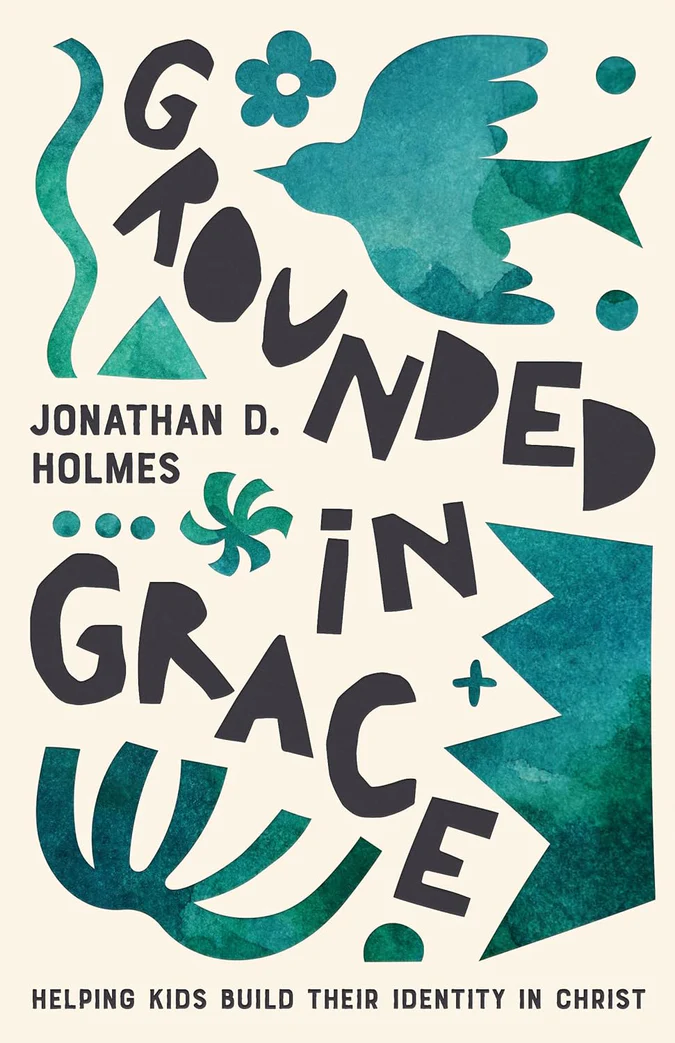
Jonathan D. Holmes
Reviewed by: John W. Mahaffy
Grounded in Grace: Helping Kids Build Their Identity in Christ, by Jonathan D. Holmes. New Growth Press, 2024. Paperback, 128 pages, $16.99. Reviewed by OP pastor John W. Mahaffy.
“Who am I?” How can parents (and grandparents) help their growing children who are dealing, or will have to deal, with that question? Holmes suggests, “Our children are under enormous pressure to figure out who they are in an environment and culture that is sending them conflicting messages” (3). The author hopes to help not only parents but also others who interact with children.
Traditionally, children found their identity by following in their parents’ footsteps and achieving approval from them and other adults. Boys might follow in their father’s trade, while the goal of girls would be to become a loving and submissive wife. More recently in our culture, “the determiner of identity has moved from something outside of you to something inside of you” (7). Your inner voice is crucial.
Holmes criticizes both approaches. Christian parents may think that they can create an environment that is protective enough that their children will simply follow them in choosing a good identity. But Holmes argues that this approach depends heavily on a parent’s ability to control a child’s sense of identity, adding, “that is far too much power for any flawed human—even a wise, loving parent—to wield” (15). The values of the culture around us do impact our children. He goes on at more length pointing out the problems with the modern identity construct, showing that it is incoherent, crushing, enslaving, fragile, performative, and ultimately an illusion.
But the situation is not hopeless. Early in the book Holmes suggests, and this becomes a theme: “The greatest problem our kids are facing regarding the issue of identity is this: an anemic and even nonexistent notion of who the Lord is and what he has called us to be” (4).
The bulk of the book is devoted to exploring five areas where young people tend to struggle with identity: academics, sports, moralism, gender, and sexuality. In each chapter the author provides an example of a child whose identity is being structured by that particular focus and describes the problems flowing out of being caught up in that identity. He includes an extended section for each entitled, “How Can Parents Help?” with practical suggestions and guidelines, emphasizing the importance of good communication, but always encouraging the parents to steer their children to look to Christ.
That focus on Christ is the strength of this book. The author understands and opposes the seductiveness of the world’s temptations. He goes to Scripture to evaluate and to steer a better course. There are corners of Christianity that recognize some of the evil of our age and seek to solve it by isolation or by moving back in history. This book is far stronger because it is biblically grounded. It sets its compass by Scripture, not simply by opposition to the sinful world.
One might not agree with every suggestion—this book, like every other, Scripture excepted, ought to be read critically. But parents will find the book practical and helpful. In his concluding chapter, Holmes lists the five areas again and summarizes:
In each of these categories, a child can wrongly root and base their sense of who they are in an activity (academics, athletics, moralism) or feeling and perceptions (gender identity and sexual orientation). What I hope you’ve seen is that none of these is unimportant in the development of who we are, but none of these should be the primary narratives in building who we are. . . . What matters is what God thinks of you. (102–103)
If God has blessed you with children, do not wait until they are struggling with issues of identity. Read the book now. (The book is for parents to read, not simply to hand to children.) Practice good communication. Now is the time to be pointing your children to the Savior. He has to be central in their lives, not simply introduced as an escape from the problems of the surrounding culture. While practical, this book does not provide you with simple rules that will solve your parenting challenges in this crucial area—sort of a Reformed version of the health and wealth gospel. Rather, it will push you to your knees and encourage you to continue looking to Christ yourself, and for your children.
March 01, 2026
February 15, 2026
February 01, 2026
January 25, 2026
January 18, 2026
January 11, 2026
Texts that Transform: Church and Ministry
January 04, 2026
© 2026 The Orthodox Presbyterian Church